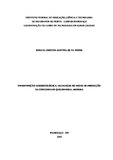Intervenção agroecológica: mudanças no modo de produção na Comunidade Quilombola Aroeira

Data
2019-10-31Autor
Nunes, Renata Cristina Santina Silva
http://lattes.cnpq.br/7632208849813054
Metadado
Mostrar registro completoResumo
Agroecology and rural education, linked to sustainable alternatives, have been changing the
way of production in different parts of the country, especially in traditional communities. These
processes have contributed to orienting farmers in the production process and developing
strategies that are able to minimize the environmental impacts generated by conventional
agriculture and, at the same time, provide strategies that may be adopted for social development
while preserving local biodiversity and sustainable means of production. The objective of this
work was to develop activities for young people and adults in a quilombola community, which
combine Rural Education and Agroecology through workshops promoted in partnership with
the rural school based on alternation pedagogy. The classes were divided into activities between
school time and community time, and some workshops were offered with agroecological
practices, according to the needs of students who were found in community time. The aroeira
quilombola community was willing and willing to change their reality by changing the means
of production. Thus, it is necessary to develop new public policies aimed at the field that unite
education and agroecology, strengthening the exchange of popular knowledge with technical
knowledge, always taking into account the way of life and production already existing in the
community, strengthening food sovereignty, agroecological practices and local development.



